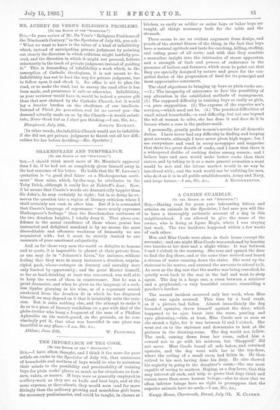MR. AUBREY DE VERE'S RELIGIOUS PROBLEMS. [To THE EDITOR OF
THE "SPECTATOR."] SIR,—In your review of Mr. De Vere's "Religious Problems of the Nineteenth Century," in the Spectator of July 8th, you ask : " What we want to know is the value of a kind of infallibility which, instead of anticipating private judgment by pointing out clearly the direction in which criticism might lawfully pro- ceed, and the direction in which it might not proceed, follows reluctantly in the track of private judgment instead of guiding it." This is demanding of infallibility a work which, in the conception of Catholic theologians, it is not meant to do. Infallibility has not to lead the way for private judgment, but to follow upon it and check it. Its office is not to plan the road, or to make the road, but to survey the road after it has been made, and pronounce it safe or otherwise. Infallibility, as your reviewer would have it, would be indeed a greater gift than that now claimed by the Catholic Church, but it would lay a heavier burden on the obedience of our intellects. Instead of Think for yourselves, and let me correct you—the demand actually made on us by the Church—it would substi- tute, Never think but as I start you thinking.—I am, Sir, &o., [In other words, the infallible Church would not be infallible if she did not get private judgment to thresh out all her diffi- culties for her before deciding—En. Spectator.]


































 Previous page
Previous page